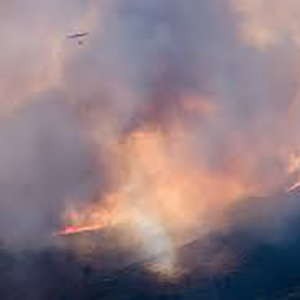
Joint Release: Wildfire smoke affecting air quality near the Williams Lake Fire
Media Contacts:
Lisa Woodard, Spokane Regional Clean Air Agency | 509.863.2463, LWoodard@SpokaneCleanAir.org
Kelli Hawkins, Spokane Regional Health District | 509.994.8968, khawkins@srhd.org
SPOKANE, Wash – Air quality, primarily near the Williams Lake fire, is in the unhealthy range on the Air Quality Index as of 10:35 a.m. this morning. Air quality forecasters with Spokane Regional Clean Air Agency (Spokane Clean Air) warn that smoke from fires, including the ongoing fires in southern BC, could filter into the Spokane area today and tomorrow.
"We are forecasting air quality in the Unhealthy for Sensitive groups/Orange for today and tomorrow, depending on wind and fire activity," said said Scott Windsor, Executive Director for Spokane Clean Air. "It is vital, especially during wildfire season, that individuals check current air quality conditions, because conditions can change rapidly, and take the necessary steps to protect their health,” added Windsor.
Dr. Francisco Velázquez, Health Officer for Spokane Regional Health District (SRHD) added, “Smoke can affect everyone. Those most susceptible to smoke should be sure their medications are on hand and to contact their health provider, if necessary.”
Unhealthy for Sensitive Groups/Orange: Sensitive groups, defined below, should take steps to reduce their exposure: Limit time outside, avoid strenuous outdoor activity, and follow tips for cleaner indoor air (provided below). Everyone should watch for symptoms as a sign to reduce exposure.
Sensitive groups include people most likely to have health problems from breathing smoke, including:
- Persons with, or recovering from, COVID-19
- People with lung diseases (asthma, COPD, bronchitis, emphysema)
- People with respiratory infections
- People with existing heart or circulatory problems
- People with a prior history of heart attack or stroke
- Infants and children under 18
- Older adults (over age 65)
- Pregnant women
- People who smoke
- People with diabetes
Symptoms of smoke exposure can be mild to severe, including coughing, scratchy throat, irritated sinuses, stinging eyes, and runny nose, shortness of breath, chest pain, and headaches. If you have heart or lung disease, smoke might make your symptoms worse. People who have heart disease might experience chest pain, a rapid or irregular heartbeat, shortness of breath, and fatigue.
If you have a pre-existing respiratory condition such as asthma, COPD (including chronic bronchitis and emphysema), or allergies, smoke may worsen symptoms (inability to breathe normally, cough with or without mucus, chest discomfort, wheezing, and shortness of breath). Seek medical attention when experiencing severe symptoms, such as chest pain or difficulty breathing. Dial 911 for emergency assistance if symptoms are serious.
Smoke and COVID symptoms: Some respiratory symptoms including cough, sore throat, and difficulty breathing are common to both wildfire smoke and to the COVID-19 virus.
Symptoms unique to COVID-19 include an increase in severity of cough, new loss of taste or smell,
nausea or vomiting, diarrhea, fever. If you’re experiencing any of these symptoms, even those that seem minor, you should test for COVID-19. Free at-home tests can be ordered by visiting the testing section at covid.srhd.org.
Steps to reduce exposure to smoke:
- Limit duration and intensity of outside physical activity.
- Stay inside with cleaner indoor air
- Close windows and doors unless it is too hot to maintain safe temperatures.
- Don’t add to indoor air pollution, such as cigarette smoking or burning candles.
- Filter indoor air through an HVAC system, HEPA portable air cleaner, or DIY box fan filter.
- Set air conditioning to recirculate.
- If unable to maintain clean air at home, go elsewhere for cleaner air such as a friend’s place, public space, or unimpacted area.
- If you must be outside, wear a properly fitted, NIOSH-approved particulate respirator, such as an N95 mask.
For more information and resources on wildfire smoke and your health:
- Spokane Regional Health District Wildfire Smoke
- Spokane Regional Clean Air Agency Wildfire Smoke
- Current and Forecasted Air Quality – Spokane County
- Statewide smoke and fire information
